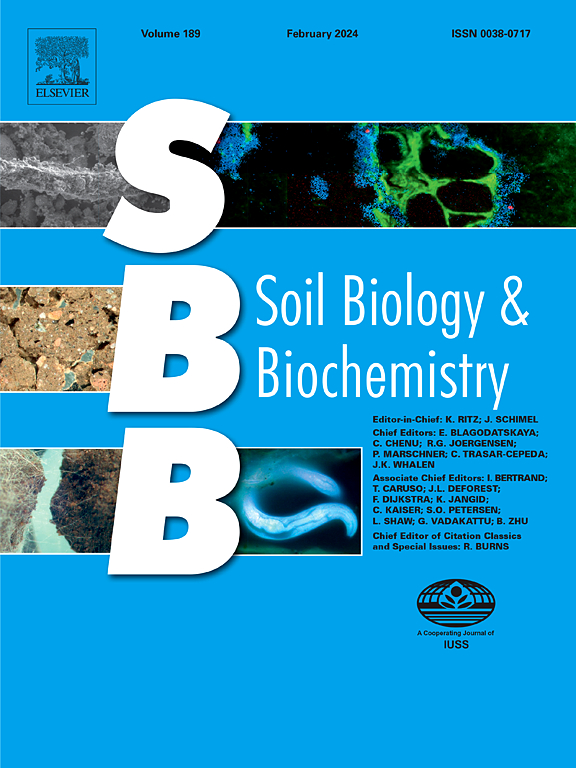土壤pH和降水对有机碳滞留的控制:一项荟萃分析
IF 9.8
1区 农林科学
Q1 SOIL SCIENCE
引用次数: 0
摘要
全球变化研究的一个核心目标是探索通过促进陆地生态系统(尤其是热带和亚热带地区的低碳农用土壤)的碳(C)固存来减缓大气中二氧化碳上升的潜力。现有证据表明,在风化的热带土壤(如 Acrisols)中,施用有机添加剂并不能有效促进土壤有机碳(SOC)的积累,但制约 SOC 固碳的具体原因并不十分清楚。在此,我们综合了 224 篇出版物中的数据,评估了 Acrisols 和其他五种土壤(Anthrosols、Cambisols、Fluvisols、Luvisols 和 Phaeozems)中有机添加剂对 SOC 储量影响的变化。我们发现,在六种土壤类型中,土壤 pH 值最低的 Acrisols 对有机添加剂的碳保留效率最低,而其他五种土壤类型之间则没有明显差异。初始土壤 pH 值和年平均降水量(MAP)是预测 SOC 保留效率的关键因素,初始土壤 pH 值越高,SOC 保留效率越低。此外,低土壤 pH 值和高平均年降水量也抑制了微生物对有机添加剂的生长,从而限制了矿物相关有机碳(MAOC)的保留,而这与 SOC 保留效率密切相关。这些发现共同表明,Acrisols 中有限的 SOC 积累可能是在酸性和潮湿条件下快速分解和微生物转化效率低下的结果。在酸度较高的热带风化土壤中开发可行的方法来提高 SOC 的保留率,重点应放在加强 SOC 形成的微生物途径(如通过施用石灰)和减少 C 的分解(如通过减少耕作或深度掺入残留物)两方面。本文章由计算机程序翻译,如有差异,请以英文原文为准。


Soil pH and precipitation controls on organic carbon retention from organic amendments across soil orders: A meta-analysis
One central goal of global change research is to explore the potential to mitigate rising atmospheric CO2 by promoting carbon (C) sequestration in terrestrial ecosystems, particularly in low-C agricultural soils in tropical and subtropical regions. Existing evidence suggests that the application of organic amendments is not effective in promoting accrual of soil organic carbon (SOC) in weathered tropical soils like Acrisols, but the specific causes that constrain SOC sequestration are not exactly clear. Here, we synthesized data from 224 publications to assess changes in SOC stocks in response to organic amendments across Acrisols and five other soil orders (Anthrosols, Cambisols, Fluvisols, Luvisols, and Phaeozems). We found that Acrisols, characterized by the lowest soil pH, exhibited the lowest C retention efficiency of organic amendments among the six soil orders, whereas no significant differences were observed among the other five soil orders. Initial soil pH and mean annual precipitation (MAP) were key predictors of SOC retention efficiency, which increased with initial soil pH and decreased with MAP. In addition, low soil pH and high MAP also suppressed microbial growth in response to organic amendments, limiting the retention of mineral-associated organic C (MAOC), which was strongly linked to SOC retention efficiency. Together, these findings suggest that limited SOC accumulation in Acrisols likely results from rapid decomposition and inefficient microbial transformation under acidic and humid conditions. Developing viable practices to improve SOC retention in weathered tropical soils with high acidity should focus on both enhancing the microbial pathway of SOC formation (e.g., through liming) and reducing C decomposition (e.g., through reduced tillage or deep residue incorporation).
求助全文
通过发布文献求助,成功后即可免费获取论文全文。
去求助
来源期刊

Soil Biology & Biochemistry
农林科学-土壤科学
CiteScore
16.90
自引率
9.30%
发文量
312
审稿时长
49 days
期刊介绍:
Soil Biology & Biochemistry publishes original research articles of international significance focusing on biological processes in soil and their applications to soil and environmental quality. Major topics include the ecology and biochemical processes of soil organisms, their effects on the environment, and interactions with plants. The journal also welcomes state-of-the-art reviews and discussions on contemporary research in soil biology and biochemistry.
 求助内容:
求助内容: 应助结果提醒方式:
应助结果提醒方式:


